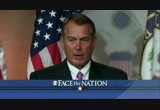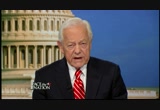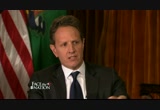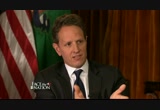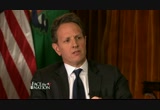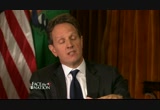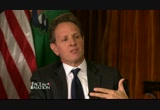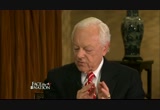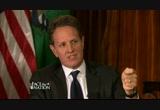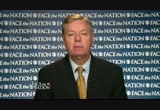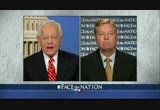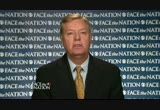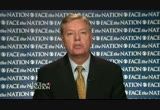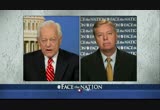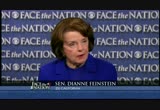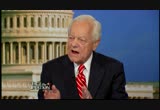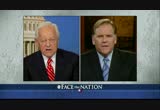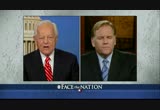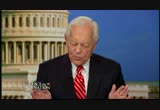tv Face the Nation CBS December 2, 2012 8:30am-9:00am PST
8:30 am
how to fix it? that's the problem. >> there's a stalemate. let's not kid ourselves. >> schieffer: treasury secretary geithner outlines his plan for us, but it won't be what the republicans want to hear. >> there's no path to agreement that does not involve republicans acknowledging that rate have to go up. >> schieffer: as the two sides look for answers on that, u.n. ambassador susan rice returned to capitol hill, trying to satisfy republican concerns about what happened in that attack in libya that left an american ambassador and three other americans dead. >> the concerns i have are greater today that they were before. >> schieffer: we'll hear from senator lindsey graham. and then we'll talk to the intelligence committee chairs in the house and senate, congressman mike rogers, and senator dianne feinstein. on page two, we'll get analysis on where the argument over the fiscal cliff goes. and the consequences if congress
8:31 am
fails to get agreement. we'll talk to maya macguineas, head of the campaign to fix the debt. mark zandi of "moody's "analytics. and our own john dicker sen. captioning sponsored by cbs from cbs news in washington, "face the nation" with bob schieffer. >> schieffer: and good morning again. treasurer treasury secretary tim geithner laid out the emotion's opening offer on how to fix the debt. it wasn't what the republicans want to hear. basically geithner said no waw to cut a deal without raising taxes on upper income americans. even though, he said he's optimistic some kind of deal can be reached by the end of the year, and he said 98% of americans will not see a tax rate increase.
8:32 am
here's what he told us when we sat down with him. >> i do think we're going to get there because the only thing that stands in the way of an agreement that's good for the economy is if a group of republicans decide they're going to block and increase in tax rates on the wealthiest americans. i think it's unlikely they will choose to do, that of course, because there's so much at stake. >> schieffer: in all seriousness, i'm told mitch mcconnell laughed when you handed in this proposal. is that true? >> they're in a hard position, bob. they really are in a difficult position. and they're going to have to figure out their politics of what they do next and they're trying to figure that out right now. we're going to work very hard at this and we're going to keep talking to each other. and, again, i think we have a very good chance for coming together on an agreement that not just protects 98% of americans from a tax increase and protects the economy from deeply damaging upfront spending cuts and protects the med from leaving us vulnerable to, you know, periodic threats of defaults by politicians, i think
8:33 am
we can do better than that and do something good for the long-term future of the american economy. >> schieffer: did you think democrats will support these tax increases? >> the tax increases in the president's plan? oh, yeah, absolutely. again, again, if you listen carefully to the political debate, there's very broad-based support now and recognition of the need to let rates go up. we think they should go back to the clinton level and bipartisan that with tax reform in limited deductions for wealthy americans. that's an essential parent of any balanced agreement. now, that's not enough. we think we can go beyond that and lock in some carefully designed savings that helps us go back to living within our means. and the president lad out a very detailed, comprehensive plan for how best to do that. he put on theitable it $16 billion in savings, and they're very detailed, and they're very well designed-- >> schieffer: what gives you reason for optimism.
8:34 am
speaker boehner says this is basically a stalemate. >> it's true that we're still a bit apart. and they're going to have to move further, and they're trying to figure out, again, what they do next in this context. again, we've given them a very detailed set of proposals. we're open to suggestions on how to do it differently. if they want to come back and say we'd like you to do this differently, do more of this, they should lay this out for us. >> schieffer: what is it what cannot change in your plan. >> our plan? >> schieffer: yeah. you said you're ready to talk. >> of course we are. president has said over and over from the beginning, again, we've laid out in detail what we think makes the most sense for the american economy today, again, glowft extend the middle class tax cuts but put in place some carefully designed savings to bring downtown long-term deficits and we should do ethics help growth in the short term like rebuilding american infrastructure, helping americans with their mortgages, extend unemployment benefits.
8:35 am
we show a way to pay for those in our plan in that context. that's what we think makes the most sense. of course, we're open to suggestions. there are going to be other ideas from democrats, other ideas from republicans. we can take a look at those ideas and evaluate them but not until we see them. >> schieffer: bottom line, though, is you're going to-- you're going to have to have more revenue and you expect to get it from upper income americans. you think they ought to pay more. >> we're going to have higher rate and higher revenue interest just 2% of americans. in any event% of americans do not need to see and are not going to see an increase in their marginal tax rates. that's a commitment of president. i think we're going to get there. the republicans have conceded-- and this is important-- they're prepared to raise revenue, raise taxes as part the deser deal but they haven't told us how far they're willing to go. >> schieffer: aren't you going to have to somewhere along the line, though, talk about entitlements and reforming
8:36 am
entitlements? >> absolutely. >> schieffer: you don't have any of that in this plan. >> that's not true. you put out detailed reforms to entitlements that total $600 billion over 10 years that build gradually over time because they're phased in carefully. the outer year savings will be larger than that, in that context. we think they're very good policy. (s don't like some of those republicans, and some republicanes, apparently, want to go beyond that. but what they have to do is tell us what they're prepared to do. and what we can't do, bob, is sit here and try to guess what works for them. >> schieffer: what is it you propose to reform? >> i'll give a couple of examples. reforming farm subsidyes, very important to do, lots of room to do sensible reforms in that context. in health care, we propose to a modest increase in premium for higher income beneficiaries. and we propose ways to make the government much smarter about how it buys medicine for medicare beneficiaries.
8:37 am
>> schieffer: why did you choose to basically say "we're going to stop letting congress have the ability to raise the debt ceiling." >> we are not prepared to let the threat of default on america's credit, the savings of americans, the investments of americans be held00 to the political agenda of a group of people in congress over time. as you saw last august, that was very damaging to the american people. it's not the responsible way it govern. >> schieffer: are you betting eventually the republicans will cave on the taxes? >> there's no-- there's no path to an agreement that does not involve republicans acknowledging that rates have to go up for the wealthiest americans. >> schieffer: you're saying you can't do it just by eliminating deductions and other-- >> very good question. you know, we've taken a careful look at this, and we think we should limit deduction but if you look carefully at how to do this, there is no way to raise a meaningful amount of revenue,
8:38 am
relative to the sights of our fiscal challenges, by just limiting deductions for wealthy americans. there's just not enough room there. you can raise a the lo of money if you're prepared to raise taxes significant she on middle class families by eliminatey deductions, but we don't think that is the way. >> schieffer: you can figure out some kind of an agreement, beyond just kicking it down want road? >> i think we can, and we have a responsibility to do that. and, again, there's nothing that stands in the way of that agreement, except for the potential risk that a group of republicans decide. they hold up an agreement because they wanted to extend tax cuts for the wealthiest that we can't afford. just remember to extend those tax cuts costs $1 trillion over 10 years. there is no way we can get to a balanced plan that puts us back on the path of living within our means, protects medicare, invests in things we need, if you extend those tax rates.
8:39 am
>> schieffer: all right, mr. secretary, thank you so much. >> thank you, bob. >> schieffer: joining us from clemson, south carolina, senator lindsey graham who said he is willing to increase revenues if the administration is willing to tackle entitlement reform. so, senator, first question, what is your reaction to what you just heard? >> i think we're going over the cliff. it's pretty clear to me they made a political calculation. this offer doesn't remotely deal with entitlement reform in a way to save medicare and medicaid and social security from imminent bankruptcy. it raised $1.6 trillion on job creators that will destroy the economy, and there were no spending controls. and i'm serious about revenue. you can limit deductions to $40,000, $50,000 a person, which takes care of the middle class. upper income americans will lose their deduction and raise about $800 billion in revenue. but i'll only do that if we do entitlement reform and the president's plan, when it comes to entitlement reform is quite frankly, a joke.
8:40 am
i don't think they're serious about finding a deal. john boehner is serious about revenue. he'll get a lot of push-back but a lot of republicans will rally about john boehner about limiting deductions to raise somewhere between $700 billion and $800 billion in revenue. and i bet you this-- if you took the president's plan and put it on the floor of the house and senate, he would get very few votes for his plan. >> schieffer: so you're sag you think that both sides-- and this is my fries that both sides would actually be stupid enough to let us go over this fiscal cliff because they can't come to some kind of a compromise? >> i would just say this, that my side knows we lost the election, and we're willing to put revenue on the today that will get some political heat for people like me. that is movement in a positive way. republicans should do revenue. we're willing to do it in a smart way. if you raise tax rates, you get capitol hill four help billion in revenue, and you hurt job creation. if you limit deductions at about
8:41 am
$40,000, $50,000 per person, you prevent the middle class and get about $800 billion in revenue. 100% of americans are going to lose everything we know as america if we don't fix enitlements. we're becoming greece because of out-of-control entitlement spending. there's no age adjustment for medicare and social security. there is no means testing, of in the president's plan. we should do what ronald reagan and tip o'neill did, adjust the age for retirements, a means test benefit, do it together, and republicans should put revenues on the table and the president's plan does nothing but damn us to becomeag greece. >> schieffer: let us shift to the whole situation of the episode that happened in benghazi, that's been kind of in turmoil. what happened? how was it that an american ambassador and three other mers died there? susan rice, who many think the president was nominating to be secretary of state, was back up on capitol hill during the week. did she help or hurt her case?
8:42 am
>> well, apparently, according to the senators she met, she didn't do herself much good. but let's just say this about benghazi-- it's just not about susan rice. it's about a system that failed. the military failed. the intelligence community failed. before and during. this is about a system designed to protect us that completely broke down. the consulate should have been closeed in the first place. i can't believe we couldn't reinforce it in seven hours. and that's where i'm going to move to next. but as to susan rice, the story she told on your show and others on 16 september, after having looked at the intelligence that was available, does not remotely meet the truth. she said that the security at the consulate was strong, substantial recall and significant on three different shows. that wasn't even in the talking points about the level of security. if you look at the evidence available, the footprint in benghazi was not strong, substantial, or significant. it was weak.
8:43 am
they had been begging for months to have more reinforcements or close the place like the british did. i think her story on 16 september was a political story designed to help the president three weeks before the election. and she should be held accountable for that. she let you and others know, by the way, this president decimated al qaeda. and if you looked at the facts around benghazi you could not have said in good congress al qaeda had been decimated anywhere in the world. and this was not a result of a video. this was a preplanned terrorist attack and they should have known it early on. so her statements on 16 september are treasure trove of misleading statements that have the effect of helping the president downplaying a debacle three weeks before the attack. the president, if he believes she is the best person? this country-- and you have a lot of good people to choose from-- to be secretary of state, that she's most talented, most gifted, the best choice he could
8:44 am
make, then he should send her up. i am inclined to summit presidential choice. elections matter. i voted for every cabinet officials, almost all of presiden president obama's judges. when he was a senator he had a different view of how to do this, but when it comes to susan rice, i can tell you as far as lindsey graham is concerned i find great fault with what she said on 16 september and in other areas i find her lacking when it comes to being the best choice for secretary of state. but this is up to the president. . >> schieffer: all right, well, lindsey graham i think you played it out in pretty uncertain terms. >> i can add one thing? >> schieffer: sure. >> the next thing lindsey graham wants to talk about is why for soviet hours on september 11 we could not reinforce the compound? did the from order the military and others to come to their aid? and if he did, when did he make that order? when was he first notified? we know every detail of the bin
8:45 am
laden raid. we don't know anything of what he did sav did september 11, and if he ordered the people to be helped and there was nothing we could do. what did he say about it? was he mad? we need to get into the details of why we left the consulate so open and unsecured when the british left and everybody else left benghazi. this is a story of system failure and if we don't get to the bottom of this, we will fail to learn. if we don't change our strategy from a foreign policy point of view, bob, change this light footprint approach on the war on terror. there will be more benghazis. >> schieffer: thank you very much. and bp's also committed to america.
8:46 am
we support nearly 250,000 jobs and invest more here than anywhere else. we're working to fuel america for generations to come. our commitment has never been stronger. you know, one job or the other. the moment i could access the retirement plan, i just became firm about it -- you know, it's like it just hits you fast. you know, you start thinking about what's really important here. ♪ >> schieffer: scrounge me the two chairs of congress' oversight committees, dianne feinstein, and.
8:47 am
mike rogers who joins me from miami. you heard what lindsey graham said. he said this is getting to be more than what susan rice gave us an explanation. he said we're talking about a complete breakdown in the intelligence, in security, in everything concerning that benghazi mission. what's your take on that? >> well, i have reviewed all of the threat warnings by the intelligence community. there were multiple threat warnings, well over 200. i have read the priority warpings. i believe that the intelligence was good. now, it couldn't say at a certain time or on a certain day. there had been prior attacks. ... it's well known the attack on the british ambassador, attack on the red cross. they both pulled out for a period of time. the fish bomb thrown over the fence which is not much but is
8:48 am
an indication. this is an interesting facility. because it isn't a consulate, as senator graham said. it's a mission, and the number of state department people there were very few, just one, two, or three at the most. and there were no records or visas that i know of. it really is, as i look at it now, a place where the ambassador could come and meet with people in that area of the country. and in fact, that's what he was to go. >> schieffer: why was he there on the anniversary of 9/11. if anybody should have known of the security situation, it would be the ambassador? >> i suspect it was his judgment call. he had a meeting, i believe, with a turkish leader that evening who he had met with. he had some meetings in the community. this was an ambassador who not only spoke the language. he spoke the dialect. he was comfortable walking down the streets. however, if you look seriously
8:49 am
at the intelligence, the country is spotted with training camps. the country is a magnet for all of these groups, and there is a kind of lawless history about the benghazi area, also. so this, i think, in my view, you can't blame the intelligence. i think you have to blame the decision makers who didn't really make the right decision. >> schieffer: and those were not bringing in security. congressman rogers, what is your take on this? >> well, i think the more we know about this-- and think dianne said it well-- the intelligence was good. i mean, the threat stream was very clear leading up to that 9/11 event. and what happened even two days later in tu nearby aby the way. we had another al qaeda event that killed four people, tunisians, protecting the u.s. embassy there. so in a matter of two days you had an al qaeda-affiliated
8:50 am
event. the intelligence said they're looking for western targets. that he want to be more aggressive. all of that is right. what i find absolute grossings in is they did not-- negligence is they did not take the right precautions -- >> schieffer: are the me just-- >> nor did they have the right plans to get them out. i tell you, this is a serious, serious event here-- >> schieffer: where will, did these people ask for help? weren't they asking for help? weren't they telling the people back in washington we need some security here? and why didn't they get it, congressman? >> that is a big part of the problem here is that if you don't-- >> well, we seem to have lost the congressman. senator, maybe you can help us. >> well, i can answer that. the ambassador was unhappy. there was a state department cable from tripoli that indicated concern with the
8:51 am
security. some improvements were made. they were, clearly, inadequate improvements. and the outside security departed when they saw people with guns coming down the street. we looked at the video and saw that. but i am also concerned about other places. i have shared my concerns with the pack taken ambassador over the pashure security situation -- situation-- >> schieffer: could i say-- >> as well as yemen. >> schieffer: let me ask you this. if there was this concern, is this why susan rice gave kind of a different story when she was on the television? was there a koch here to try to cover up things that should have been done and weren't done and just said al qaeda was not a threat? >> now you come down to the merit of hastily prepared talking points. i do not believe the intelligence community should prepare these talking point. i think additionally, i think
8:52 am
somebody should have picked the phone and asked a survivor, what happened. tell me the story the, the next morning. general petraeus beache briefed us on the 13th. there is a transcript. he said very clearly there were al qaeda elements involved. apparently the initial talking point had al qaeda mentioned in it, and they were removed. as mike morrell said, they were removed by the c.i.a., not the f.b.i. so the whole issue of talking points by committee where the initial analyst of the c.i.a. does talking points, puts something out, and then it goes from agency to agency, who pore over them and say, well, you better not use this because it might jeopardize a contact or something else. and so al qaeda was pulled out of it. . >> schieffer: we're just about out of time. but let me ask you this, this whole idea-- i take it you agree with me-- it is not right to
8:53 am
8:54 am
you have a plan? first we're gonna check our bags for free, thanks to our explorer card. then, the united club. my mother was so wrong about you. next, we get priority boarding on our flight i booked with miles. all because of the card. and me. okay, what's the plan? plan? mm-hmm. we're on vacation. there is no plan. really? [ male announcer ] the united >> schieffer: when congress and the white house square off any more, it was like a play. the first act, both sides say
8:55 am
the problem is serious and pledge to work together. act 2, scene 1, the actors preach to the choir. each side talks mostly to their open people and stress the part about never giving up their principles. in scene 2 of act 1, each side lays out their opening off, which is quickly followed pie the other side saying no way. modern technology has added a chorus of ridiculous tweets as background music to that. but it is not until deep into act 3 when the two sides finally close the door and start talking in private to each other that anything of significance happens or doesn't. i think it's possible that something of significance could still happen in act 3 of this drama. i sure hope so. but we are not there yet. not even close. the curtain is still up on act 2. but what i keep wondering is why can't we start this play with act 3 or just make it a one-act play? start with everyone meeting privately and quietly out of the
8:56 am
limelight, get a sense of what's actually doable and them work from there? no disrespect to the actors, but this usual plot is really getting old twins. i didn't see them coming. i have obligations. cute obligations, but obligations. i need to rethink the core of my portfolio. what i really need is sleep. introducing the ishares core, building blocks for the heart of your portfolio. find out why 9 out of 10 large professional investors choose ishares for their etfs. ishares by blackrock. call 1-800-ishares for a prospectus which includes investment objectives, risks, charges and expenses. read and consider it carefully before investing. risk includes possible loss of principal. aids is not going to take my baby. ♪ aids will not take our future. ♪
8:57 am
273 Views
2 Favorites
IN COLLECTIONS
KPIX (CBS) Television Archive
Television Archive  Television Archive News Search Service
Television Archive News Search Service  The Chin Grimes TV News Archive
The Chin Grimes TV News Archive 
Uploaded by TV Archive on

 Live Music Archive
Live Music Archive Librivox Free Audio
Librivox Free Audio Metropolitan Museum
Metropolitan Museum Cleveland Museum of Art
Cleveland Museum of Art Internet Arcade
Internet Arcade Console Living Room
Console Living Room Books to Borrow
Books to Borrow Open Library
Open Library TV News
TV News Understanding 9/11
Understanding 9/11